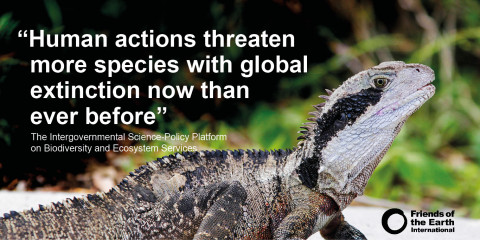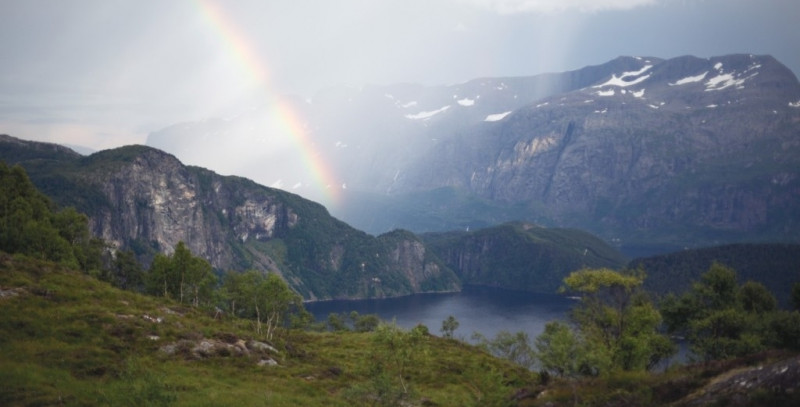European governments and the European Union must take a lead in halting global ecological collapse, warned Friends of the Earth Europe, in reaction to a major global assessment published today.
Europe driving nature loss
Europe’s inadequate action to save its own nature, its over-consumption, intensive agriculture, exploitation, and pollution, are contributing to the dramatic global collapse of nature. Together with climate change, this is creating a double global ecological emergency.
Jagoda Munic, Director of Friends of the Earth Europe said:
“The decline of global biodiversity is, alongside climate change, setting us on a path to catastrophe. Protecting nature is intrinsically linked to human well-being – if we don’t reverse its decline now, we are creating a bleak perspective for future generations.
“Europe has a huge responsibility to halt this ecological crisis. Our overconsumption of soy, palm oil, and raw materials is devastating wildlife and communities in the Global South. Intensive chemical farming and destructive developments are destroying what is left of nature here in Europe – where we’re failing to implement nature protection laws.
“Communities are standing up to defend their nature – and it is now finally time for politicians to match them with urgent action to tackle the corporate interests driving the death of our nature.”

Nature and ecosystems are in decline across Europe – a quarter of Europe’s wild animals are severely threatened, half of our habitats are in?an unfavourable?condition, and ecosystem services are deteriorating.?The global picture is just as bad.
Ecological collapse – the facts:
The Global Assessment Report released today by the Intergovernmental Science-Policy Platform on Biodiversity and Ecosystem Services (IPBES) – the biggest intergovernmental panel of scientists on this issue – sets out stark warnings:
- More species are threatened with extinction now than ever before – 25 per cent of plant, animal and fungi species (suggesting around 1 million) face extinction.
- The global biomass of wild mammals has fallen by 82 per cent.
- 75 per cent of earth’s land surface has been severely altered, 66 per cent of the ocean area is experiencing increasing multiple impacts, and over 85 percent of wetlands present in 1700 have been lost.
The IPBES report also exposes the unequal distribution of the benefits and burdens in the use of biodiversity. The world’s poorest people who have contributed least to climate and ecological collapse are already experiencing the effects of nature’s depletion, for example by suffering more landslides and floods linked to deforestation and soil erosion.
Power to indigenous communities
In the Global South communities defending their territories and collective rights are increasingly being expelled from their land, yet the IPBES report finds that nature managed by indigenous peoples and local communities – although under increasing pressure – is generally declining less rapidly in indigenous peoples’ land.
Karin Nansen, Chair of Friends of the Earth International, said:
“We welcome the acknowledgement that we need major system change to avert ecological collapse. We can turn this around, but it is dependent on governments wrestling power back from corporations and putting it into the hands of people and communities. The solutions are clear and achievable if the political will is there – massively ramping up agroecological farming and community energy, restoring forests, protecting indigenous peoples’ and peasants’ rights, and cutting overconsumption and land grabbing by the North.”
We can only stop #biodiversity and #climate collapse with #SystemChange. This can only be achieved by giving the power to the peoples, including #Agroecology, small scale fishing and community forest management. #IPBES7 https://t.co/XC5ejDbKgl pic.twitter.com/BUf74o88ru
— Friends of the Earth (@FoEint) May 6, 2019
What must Europe do?
Safeguarding our nature from loss is vital; whilst renaturing is essential to tackle the twin threats of biodiversity loss and climate change.
- Cut consumption that damages global biodiversity: The meat and dairy industry is one of the biggest contributors to deforestation, together with increasing demand for palm oil for processed foods and biofuels. Cutting meat, dairy and agro-commodity consumption would free up vast swathes of land and boost biodiversity. Local sustainable plant proteins, or meat and diary products raised on pasture or home-grown feed without soy is a better option.
- Reform farming: A switch from intensive to agroecological farming would enable us to cut pollution from pesticides and restore habitats enabling wildlife to thrive. The IPBES report recognises the importance of removing harmful subsidies and perverse incentives. The EU’s Common Agricultural Policy must undergo a radical overhaul so that farmers are rewarded for farming with nature.
- Protect current nature sites and extend nature restoration: Too many of Europe’s most important nature sites are under threat from damaging development – such as Kresna Gorge in Bulgaria or the Akamas peninsula in Cyprus – or are in poor condition. The laws protecting these sites must be properly enforced, with effective management of important nature sites. Europe needs extensive habitat creation with a focus on renaturation and restoration, and linking up nature sites – thereby boosting biodiversity, helping reduce flood risk and absorbing climate-warming emissions from the atmosphere.
- Governments must avoid false solutions to the duel threats of climate change and declining nature, and instead must focus on genuine action to address the drivers of nature’s decline and carbon emissions. Governments should not be supporting projects to offset carbon which lead to the destruction of biodiversity including vast planting of bioenergy crops and monoculture tree plantations. The EU should also abandon plans for biodiversity offsetting which would allow developers and infrastructure projects to continue to degrade or even destroy nature by paying to attempt to recreate it somewhere else.
- Lastly, governments must acknowledge people’s Right to Nature and put it to the core of decision making – with local nature access proven to provide health and wellbeing benefits for all.
Europeans are REALLY concerned about #nature loss. And they want the EU to ACT.
So @KarmenuVella, will you do what citizens want? Leave a legacy – enforce EU nature laws, end chemical farming, end nature loss#NatureAlert #IPBES7 https://t.co/0L75uCsGwI
— Friends of the Earth (@foeeurope) May 6, 2019







